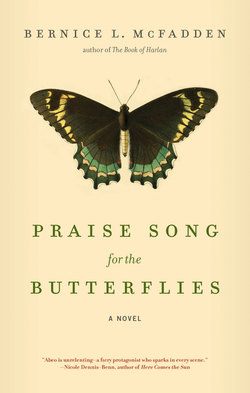Читать книгу Praise Song for the Butterflies - Bernice L. McFadden - Страница 17
На сайте Литреса книга снята с продажи.
Оглавление6
It was a known but seldom discussed fact that Ismae’s grandfather, Nsun Vinga, had brought shame and bad luck onto his family.
When Nsun was fourteen years old, a group of white tourists came to visit his village. They arrived with cameras swinging from their pale necks, bottles of bug spray and rolls of toilet paper tucked into their knapsacks. They brought gifts of crayons, coloring books, pencils, notebooks, and candy for the children. For the adults—secondhand clothing, soap, deodorant, large tubs of Vaseline, and sanitary napkins.
The white people arrived in a dented passenger van that belched brown smoke from its exhaust pipe. It was that van that started the problems for Nsun. The driver had left the keys in the ignition—Nsun spotted this, climbed into the vehicle, turned the key, and the engine sputtered to life. He’d never been in an automobile before and so he sat there pressing the pedals with his feet and laughing at the sound of the motor racing away beneath the hood. After a few moments, he took hold of the gear stick, pulled it toward him, and the vehicle began to roll backward. Nsun yipped in surprise and glee.
Hearing the noise, the driver rushed out from the hut he’d been resting in and hurried toward the moving vehicle. Nsun, unable to stop the van from rolling, leaped out and took off running. The van rolled over a wire fence, down a hill, and into a herd of grazing goats, crushing two female kids.
Nsun was caught and punished with a severe whipping, which left scars on his body that he would take to his grave. His father promised the owner of the goats that he would replace the dead property; but he was a poor man and never had enough money to honor that pledge. To make matters worse, those particular goats were not just animals kept for milk, flesh, and hide; they were pets. In fact, they were the owner’s favorite pets. The death of the goats left the owner inconsolable, and three months after the unfortunate incident, the old man succumbed to a broken heart and died. So the wrong was never set right and this, of course, displeased the gods.
Nsun went on to live a long and fairly happy life. Yet his offense was still alive and well and lurked among his descendants like a specter, awaiting retribution. That time, according to Grandmother, had finally arrived.
It seemed to be true.
Wasik had not taken Grandmother back to Prama and this act—or non-act—created a wedge between Wasik and Ismae.
Ismae had moved into the guest room and taken Agwe with her.
The investigation was still dragging on, there seemed to be no end in sight, and the money in his bank account was disappearing as quickly as if he’d set a match to it. Soon they’d be penniless, and then what would they do?
Grandmother caught Wasik firmly by the chin one evening and forced him to look into her lined face. “Things are getting worse for you. Think about your wife and your son.”
Wasik cringed, tried and failed to pull away from her vise grip.
“I know you love her, but she is not your daughter, she is not of our blood. It is the Vinga’s family sin to fix; if she won’t do it, then you must.”
“But Mama—”
“Take Abeo to a shrine and offer her to the gods. Then and only then will things get better for you.”
And with that, she released him and lumbered off to her bedroom.
* * *
When Wasik took the solution to Ismae, her hand fluttered to her parted lips to block the laughter chugging up from her throat. Little good it did. When it reached her lips, the laughter plowed through her fingers and exploded into the room.
Wasik watched in silence, the corners of his mouth twitching. True, Ismae’s laughter was infectious, but more than that, Wasik realized just how ridiculous his suggestion sounded.
When Ismae finally composed herself, she dabbed the corners of eyes, asking, “You’re joking, right?”
Wasik tried to smile, but only one side of his mouth cooperated.
“Yes, of course I’m joking,” he chuckled ashamedly.
Ismae nodded her head, still grinning. “That was a good one,” she clucked, reaching for her hairbrush. “A really good one.”
